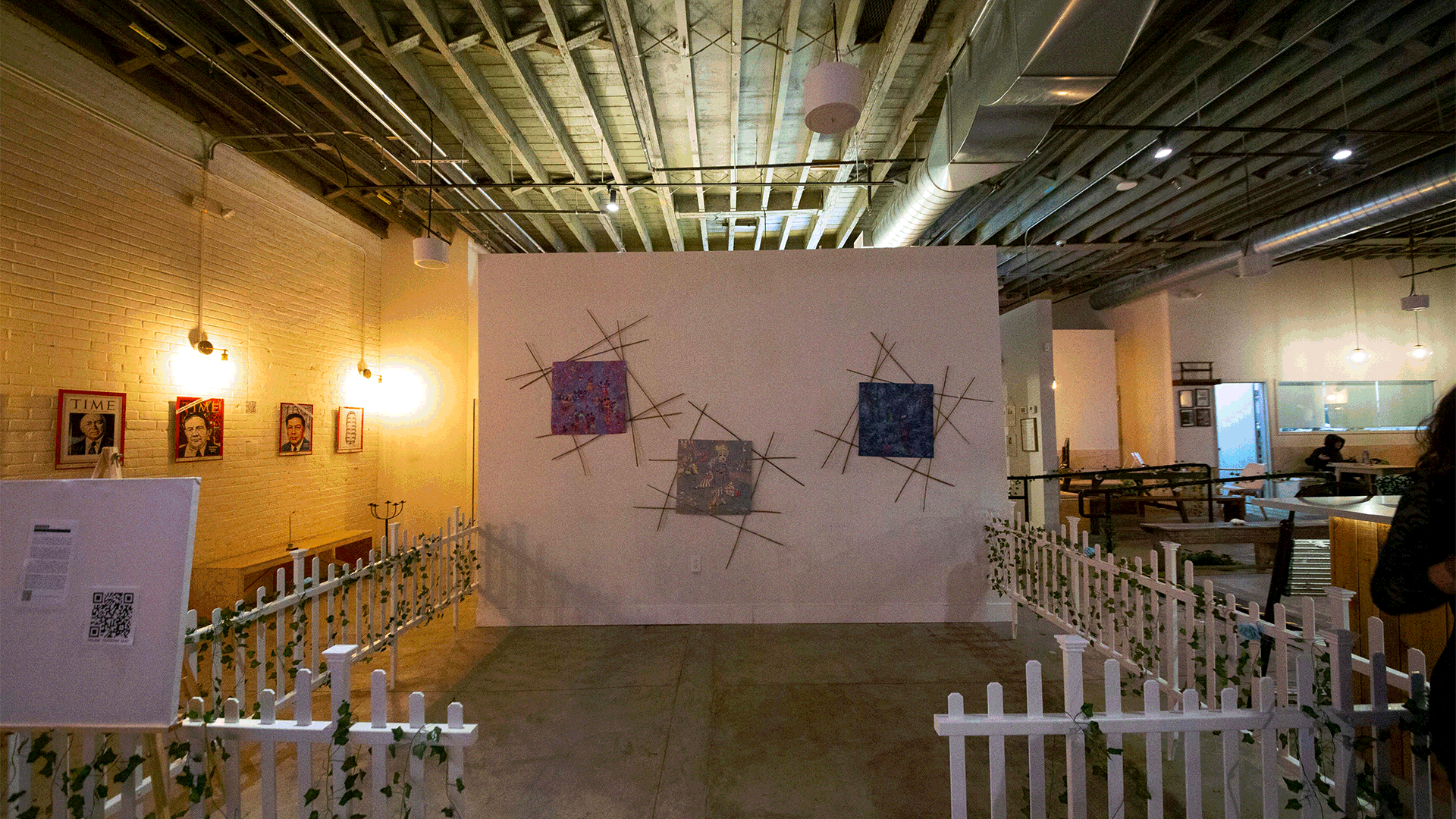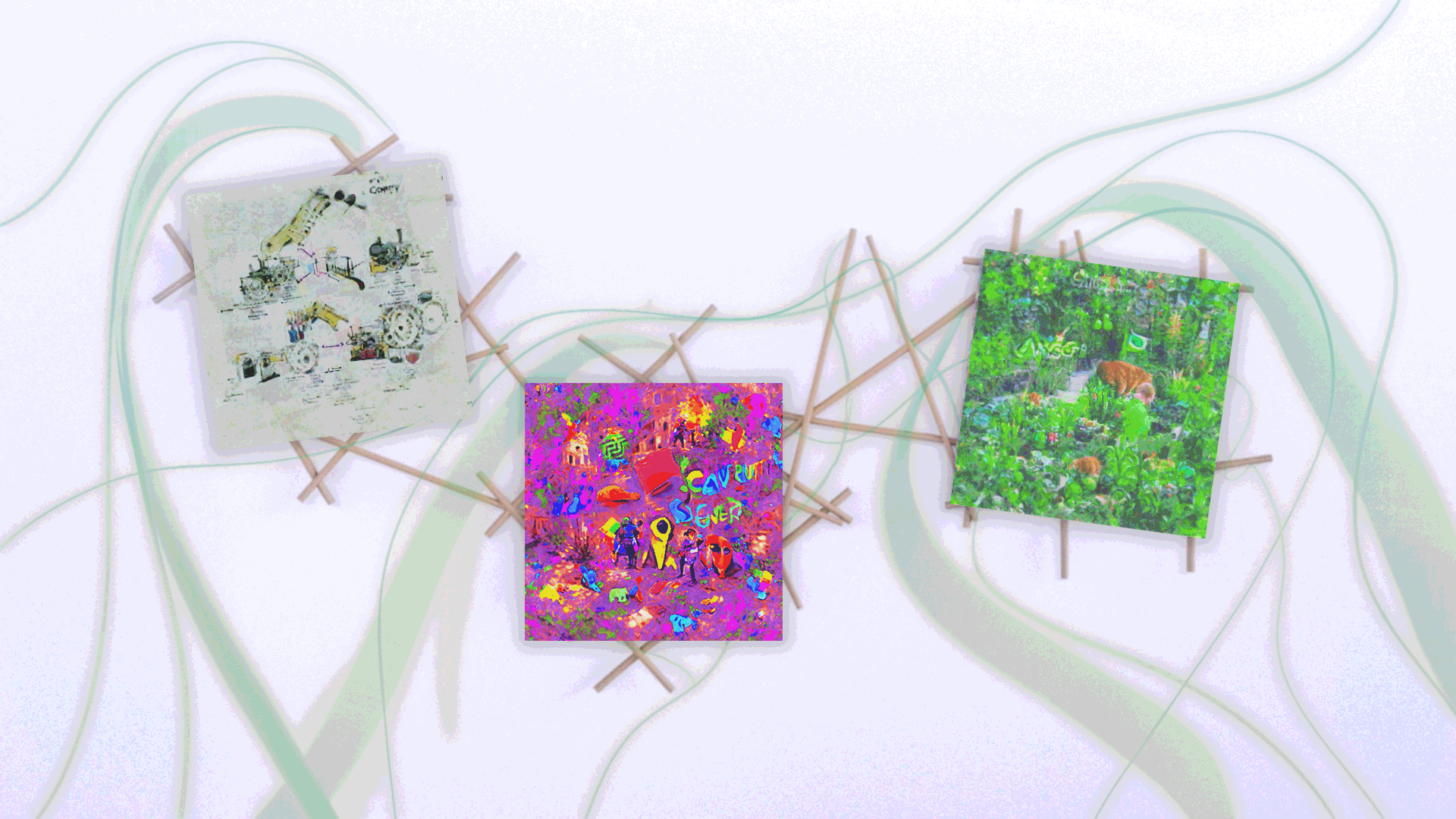CURATIVE
XR
Bridging the gap between physical and virtual worlds, digital artists and experience designers from around the world, currently based in New York and London came together to design this experience.
OVERVIEW
Curative XR is a mixed reality experience exploring computational creativity, authorship, and encoded accountability. Who is the author of AI generated artwork? And who owns the passive data people shed simply by engaging with the internet? Curative transports you to the atelier of an artificially intelligent artist, allowing you to co-create a piece of artwork that exists at the intersections of the physical and digital worlds.
Outcome
Exhibited as part of 'GAEA: A Garden of 2nd and 3rd Dimensions' at Mika, Bushwick
Featured in Pratt Research Open House 2022
Featured in RCA WIP Show 2022
Timeline
October '21 - December '21
My Role
Product Design
Creative Lead
Design Research
Screenplay
Fabrication
CAD Renders/Assets
In Collaboration with
Department of Digital Arts, Pratt Institute, Resources
Jay Jeon, Co-designer
Luisa Charles, Co-designer
Orion Dai, Technical Support
Advisor
Sophia Sobers

PROCESS
The design process began with site visits and measuring the installation area. Next, we began brainstorming the overall themes of the exhibition and conceptualized the execution of our main themes for the project. This discussion concluded with the following takeaways,
-
Artificial Creativity: Creating artwork with an AI
-
Authorship: Who is the owner of AI created works
-
Inspiration and creative accountability: Concerns surrounding profiting off of creative work (NFT's etc.), copyright law and who has the right to profit from an AI's work
-
General awareness: Who owns the passive data people shed simply by engaging with the internet
-
Bamboo frames on the wall were constructed using 5-6 canes assembled in place with copper wire. The dimensions of these frames was decided in relation to the AI imagery that would be augmented on it.
-
AI artwork was generated using the Deep Daze AI algorithm with prompts that would categorize each visitor in one of 16 MBTI personalities. For example, if the answers from an online persona quiz indicated that the visitor was an INTJ personality type, the prompt in the system was,
-
An evil genius in their colorful lair
-
A neatly planned calendar with bright yellow highlighter
-
Imagination flowing from the brain
-
PROTOTYPING
We decided to showcase the Augmented Reality piece using Magic Leap headset as a narrative story lead by an AI artist - represented by a guiding light that brings you around the space. The project was primarily designed in Unity and coded in C++ using the Magic Leap develop documentation. The narrative and video assets were made using Adobe Premiere Pro and Vocalware software. 3D assets were made using Autodesk Maya, Cinema 4D, Unity primitive builders and the Unity asset store. We included spatial mapping technology to enhance the user experience and immerse them in the gardenscape designed as an AI artist’s studio.
OUTCOME
Users begin by filling out an online habits and data privacy quiz before stepping into the experience. This both primes the audience to feel as if their data privacy is being compromised and sets the tone for the experience, as well as sorting people into one of 16 different online personas which affect the outcome of their mixed reality experience.
They then step into a bare gardenscape, populated by virtual reality foliage. Having been inspired by the user's online personality, the AI artist takes audience members through the process of how Machine Learning algorithms generate imagery, ultimately leaving visitors with 3 pieces of unique AI artwork created in response to the initial quiz answers.Each session ends with a decompression area where the visitor is questioned about the ownership of the artwork they co-created with the AI.
REFLECTION
“ It was a very impressive experience. I thought the way you organized for different types of feedback and managed the queue were really thoughtful. It made me reconsider my online experience — much of which I take for granted. In fact I just thought about your project while clicking "Cookie Settings" yesterday rather than "Accept Cookies". ”
- Amanda Huynh, Assistant Professor at Pratt Institute
Bridging a gap between the physical and virtual worlds, we created 3D assets to visualize/ augment what the creative studio space of an AI artist would look like,
-
Guided by a network of vines/net/neurons - representing the neural network that drives the AI
-
Creating parallels between natural and artificial, fitting in with theme of exhibition
-
Natural landscape grows around you as you move through the space
-
Push and pull between you and the AI - ability to make choices/have your own life and personality affect the final outcome, but being forced to work within the frameworks of the AI/the programme leading to questions on authorship

Moodboard: Brainstorming with the team and final selection of ideas

Asset generation: 3D modeling and rendering virtual assets

The Curative team

Flowchart: Mapping our user journey in relation to the overall theme
The next step included generation of assets, both physical and virtual that would go hand in hand in the Augmented Reality piece. To showcase images/ artwork generated by the AI artist, we decided to curate the studio with bamboo frames on the wall, 3D replication of the frames in the virtual space, a physical and digital easel with information about the piece, and finally an orb that would be animated and used as the representation of the AI artist in the space.

Fabrication: Construction and installation of bamboo frames on the wall

Finalized garden scape to be augmented on site
OVERVIEW
Curative XR is a mixed reality experience exploring computational creativity, authorship, and encoded accountability. Who is the author of AI generated artwork? And who owns the passive data people shed simply by engaging with the internet? Curative transports you to the atelier of an artificially intelligent artist, allowing you to co-create a piece of artwork that exists at the intersections of the physical and digital worlds.
Outcome
Exhibited as part of 'GAEA: A Garden of 2nd and 3rd Dimensions' at Mika, Bushwick
Featured in Pratt Research Open House 2022
Featured in RCA WIP Show 2022
Timeline
October '21 - December '21
My Role
Product Design
Creative Lead
Design Research
Screenplay
Fabrication
CAD Renders/Assets
In Collaboration with
Department of Digital Arts, Pratt Institute, Resources
Jay Jeon, Co-designer
Luisa Charles, Co-designer
Orion Dai, Technical Support
Advisor
Sophia Sobers
ANORA
AMBIENT NOSES
A cross-modal toolkit comprising a family of smart lighting fixtures for the home that sense dangerous gasses for those who don’t have the ability to smell.

Unity working files and testing with the Magic Leap headset

Spatial mapping and orientation

Users begin by filling out an online habits and data privacy quiz before stepping into the experience

Inspired by the user's online personality, the AI artist takes audience members through the process of how machine learning algorithms generate imagery

AI artwork created in response to the initial quiz answers

Decompression after the experience
